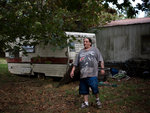

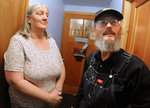
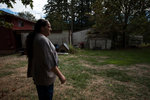

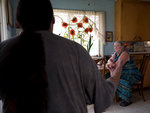



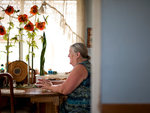
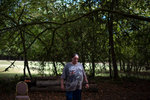
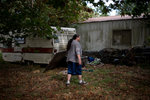
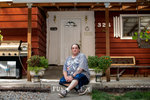
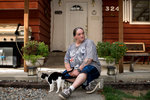




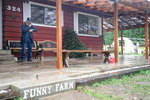
In Lewis County, if you’ve got nowhere else to go, you can still go to the Funny Farm.
For more than 10 years, Funny Farm Addiction Recovery Inc. near Napavine has taken in homeless recovering addicts, providing a safe place for them to stay clean and help residents make it to court dates and 12-step meetings.
“There is no place out there like this. It’s a recovery house,” said Jayne Brooks, who runs the Funny Farm with ex-husband Harvey Brooks. “It’s kind of like a family when you get a bunch of people here.”
Longtime resident George Casey came to the Funny Farm about three years ago, nursing a fragile 28-day stint of sobriety. He hasn’t left. Today, he helps run the farm.
“It was my saving grace,” he said.
Casey stayed on partly to help out when Funny Farm founder and patriarch Harvey Brooks, who is now recovering from pneumonia, started having medical problems.
“If it wasn’t for (Harvey) I’d have never made it,” Casey said.
In the past decade, more than 350 people have stayed at the Funny Farm, Jayne Brooks said.
Harvey Brooks, 54, bought the property more than 10 years ago and started what would later become the Funny Farm by helping one addict who was attempting to stay clean, he said in a phone interview from his hospital bed last month.
“I made God a promise,” he said. “God’s the one that helps people. I just provide a clean and sober place for them to sleep. I just get to watch.”
Today, many people are referred to the Funny Farm when they get out of jail or treatment programs, and have no other clean and sober home to turn to.
“People know it’s a good place to come to. It’s a safe place,” Jayne said.
The Funny Farm provides more than just regular meals and a warm bed to sleep in. Casey said the homey, family environment helped him maintain his sobriety in the long run, despite decades of drug use in the past.
Many other residents feel the same say, Jayne said.
“A lot of these people, they’re throwaway kids … their families don’t want anything to do with them,” she said. “This is a place they can come and stay and get clean and work on their self-esteem.”
While many appreciate how the Funny Farm differs from an institutional setting — such as jail or a formal treatment program — the farm still has a set of rules each residents is expected to follow. Residents have to go to four 12-step meetings each week. The property includes a fire pit where they have a fireside meeting each week. Residents recently helped make new wood benches around the fire. Each person has to help around the house and clean up after themselves.
“That’s a bigger chore than you’d imagine,” Casey said. “Sometimes they don’t get it.”
The house has room for eight men and four women. Residents also help around the house and take care of the farm’s animals, which include emus, llamas, chickens and cats, among others animals. Residents help raise emus from eggs, incubating them in a separate enclosure to protect the babies from their clumsy parents.
“They learn responsibility,” Jayne said.
Residents help with cooking and cleaning, and often learn important life skills they might never have been exposed to.
“They think cooking is the food at the deli,” Jayne said. “One person didn’t know milk came from cows. It’s kind of like teaching them the things we learn when we’re small.”
Most importantly, residents aren’t allowed to have illegal drugs or alcohol under any circumstances.
“That’s the one rule if they break they can’t come back,” Jayne said.
When somebody violates that rule, she reports them to law enforcement or the state Department of Corrections.
While the Funny Farm takes residents many shelters turn out — such as felons — they are still very selective about their residents. Each possible resident goes through a screening and interview process. The home doesn’t have a detox program, and requires residents to be drug-free when they move in.
“You get a good feeling or a bad feeling,” Jayne said.
Residents under Department of Corrections or drug court supervision get some priority, Jayne explained, because it shows they are accountable.
“They went to any length to do the drinking and the drugging,” she said. “They’ve got to go to any length to get clean.”
Beyond following the rules and making it to their meetings, the Funny Farm doesn’t have high expectations of its residents. Harvey and Jayne, and now Casey, who also helps run the house, give residents room to breathe.
“Everybody has a dream … or a goal,” Jayne said. “Sometimes they just don’t know how to get to that.”
While Harvey Brooks has now counseled hundreds of addicts in his home, he was once on the other side of the relationship, Jayne said
“When I first met him, he was 15, I was 18,” she said. The pair were married for 16 years, but alcohol came between them.
The couple divorced, and didn’t reconnect for many years. One year, not long before the Funny Farm became a fully fledged recovery house, Jayne said that although she never had her own addictions, she started going to a 12-step program for families of addicts.
“That’s when he and I started talking again,” she said.
Jayne said she was determined to build a relationship with her now sober ex-husband for the sake of their three children together.
Harvey’s past — his first-hand knowledge of addiction — is part of what makes him a good influence on residents, Casey said.
“Harvey went through what I went through,” Casey said. “When I got here, I saw that.”
A lot of residents have been just as successful as Casey, Jayne said, but not all of them.
Some leave the house and continue their recovery, going on to lead productive lives. Others relapse.
“It used to kind of upset me. Harvey says it’s the nature of the beast,” she said. “You hope for everyone that they get it. That’s the gamble you take.”
In the beginning, Jayne said, she held the Funny Farm residents at arms length — she didn’t want to get to know the people who lived there. At first, she didn’t even like being at the house.
However, after a little while, Jayne said she began to see the farm’s residents as people, not just as drug addicts.
“You start seeing the pain they have,” she said. “They’re trying to fix this thing, trying to fix families and their broken past. I’ve learned they’re people, and they need people to care for them.”
And from his hospital bed, Harvey said he’s not done.
“There’s more for us to do,” he said.